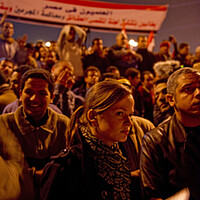As Cairo reels, Egypt military's opponents vow daily protests
Loading...
| Cairo
A wave of violence swept across the Egyptian capital today as gunfire rang out in multiple neighborhoods where supporters of the deposed president, protesting in a “Day of Rage,” clashed with residents and security forces.
Unrest spread throughout the country, killing at least 60 people, as Egypt descended into even deeper instability following the police crackdown Wednesday on supporters of deposed President Mohamed Morsi. Officials said at least seven police stations came under attack today, and multiple churches were reported attacked.
As the dead and wounded poured into a mosque-turned-makeshift-hospital near the site of the fiercest fighting in the capital, in what is becoming a recurring scene in Cairo, the alliance that had organized for today's protests, including the Muslim Brotherhood, called on protesters to leave to avoid more bloodshed. The alliance also announced that protests would be held daily in Cairo, raising the prospect of further unrest as some protest leaders say it's getting more difficult to keep people angered by the deaths from turning to violence.
Told that private television stations were showing footage of armed men shooting automatic rifles in the protests, Mohamed Okda, a spokesman for the Anti Coup Alliance, made up of the Brotherhood and several Islamist parties, said leaders were calling for peaceful protest but “I wouldn't be surprised” if some young people were turning to violence.
“People are very angry,” he said. “The youth are basically beyond control. The youth are very angry, calling for blood, and we can't control them.”
He said the military and police were killing protesters with live ammunition. “We hope the military will come to its senses,” he said, but if not – “it's just going to be more violence.”
The Muslim Brotherhood is reeling from the police attack on two protest camps Wednesday. More than 638 people died when the police, using tear gas and live ammunition, dispersed the camps where Morsi supporters had camped for a month and a half, and violence erupted across Egypt. The death toll is likely far higher.
The camps were set up in opposition to the military's ouster of Morsi on July 3, which followed massive protests around the nation calling for Morsi to step down.
In the capital today, protesters gathered at dozens of mosques around the city, intending to converge on a central square. After Friday prayer, hundreds poured out of Al Nour mosque in the Abbaseya neighborhood, pumping their fists in the air and chanting against the military and the Army chief, Abdel Fattah al-Sisi. Area residents hostile to the Islamists gathered to watch, tensely, as people filed out of the mosque and moved toward Ramsis square, the meeting point for all the Cairo marches, in the broiling afternoon heat.
But by the time the march reached Ramsis, the sharp sound of gunfire echoed across the square, and bleeding men were being ferried away by motorcycle. The fighting raged near a police station, where protesters appeared to be battling the police and civilians.
Some of the protesters viciously beat a man in civilian clothes, as some in the crowd shouted he was an Army officer. Though some tried to help him, the crowd pummeled the man until he was still, then carried him away by his arms and legs, his battered head lolling.
A nearby mosque was converted into a makeshift hospital, in what is quickly becoming a custom as violence roils the capital. While some were still burying the dead from Wednesday's violence, new casualties were brought up the blood-stained steps into Fath mosque, where dead and wounded protesters laid on the green carpet under soaring, beautifully decorated ceilings as doctors and medics worked desperately. By late afternoon, 27 bodies lay in rows on the floor; the badly wounded continued to pour in as frantic volunteers shouted and darted across the building.
The volunteers were unsuccessful in saving one man, whose shirt was soaked in blood from a gunshot wound. They pulled a wallet from the pants pocket of the now lifeless body, finding his national identity card to learn his name and hometown. Among the row of the dead, one man used a wet rag to wipe the blood off the face of a body. Another man sat at the head of one body, his face crumpled as he cried.
But most protesters said such danger did not deter them. “When you have an aim you can fight for it even if you might be hurt,” said Ramy Sameh. “Many of my friends died, and I can't be better than them. There is no option now. We go and then God will aid us. We do what we can do, what is our ability. If something is not right, we have to say it is not right."








